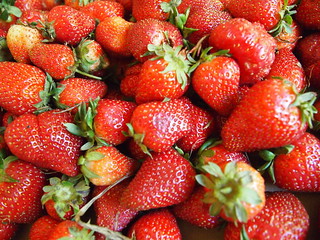8 Places to Pick Your Strawberries by Edible Long Island
 It’s peak season for picking strawberries! This transition from Spring to Summer provides a bounty of fresh vegetables and fruits, so find local farmers near you to harvest your own. Yum, yum. Edible Long Island has done the legwork for you here, check out where to go on Long Island for fresh strawberry pickings.
It’s peak season for picking strawberries! This transition from Spring to Summer provides a bounty of fresh vegetables and fruits, so find local farmers near you to harvest your own. Yum, yum. Edible Long Island has done the legwork for you here, check out where to go on Long Island for fresh strawberry pickings.
Amazon Buys Whole Foods for 13.7 Billion Dollars
Whole Food stores will continue to operate under the Whole Foods Market brand, the CEO will remain as will the company’s headquarters in Austin, Texas (woot! woot!). Nonetheless, a lot is about to change for foodies and whole food retails, such as Walmart, Target, Kroger and Walmart whose sales have started to tumble. NPR interviewed food analyst David Portalatin of the NPD Group, a market research company.
“The brick-and-mortar retail business that pioneered organic, fresh food and the country’s dominant e-commerce company make a powerful combination.” Convenience is the reason why more and more consumers move to online grocery shopping, but the challenges have been buying fresh food (the final frontier for Amazon!). I’m not quite sure how I feel about buying whole foods online, ‘without being able to feel, see and touch the fruits and vegetables’ I’m buying, I believe we might be more disconnected than ever from our food supply chain!
How Whole Foods Became the Organic Giant
“Led by co-founder John Mackey, Whole Foods Market quickly grew from a small store in Austin, Tex., to the largest natural-foods supermarket chain in the United States.” Check out this NY Times article for a short history of Whole Foods (a necessity for a lot of my food shopping, although it can be a bit pricey!).
Beyond Meatless Mondays: How to Get More Plant-Based Meals on American Plates
 “For some people, going full-on vegan is a no-brainer for a healthy and sustainable future. For many others, decisions about eating meat—how much, how often, and what kind—are more nuanced. Late last month, several dozen chefs, policy wonks, entrepreneurs, scientists, and money mavens gathered for a summit at New York University to discuss ways to achieve a “reducetarian” solution, a gradual drawdown of meat consumption that might add up to lasting benefits for humans, animals, and the planet.” – Civil Eats
“For some people, going full-on vegan is a no-brainer for a healthy and sustainable future. For many others, decisions about eating meat—how much, how often, and what kind—are more nuanced. Late last month, several dozen chefs, policy wonks, entrepreneurs, scientists, and money mavens gathered for a summit at New York University to discuss ways to achieve a “reducetarian” solution, a gradual drawdown of meat consumption that might add up to lasting benefits for humans, animals, and the planet.” – Civil Eats

Comments are closed.